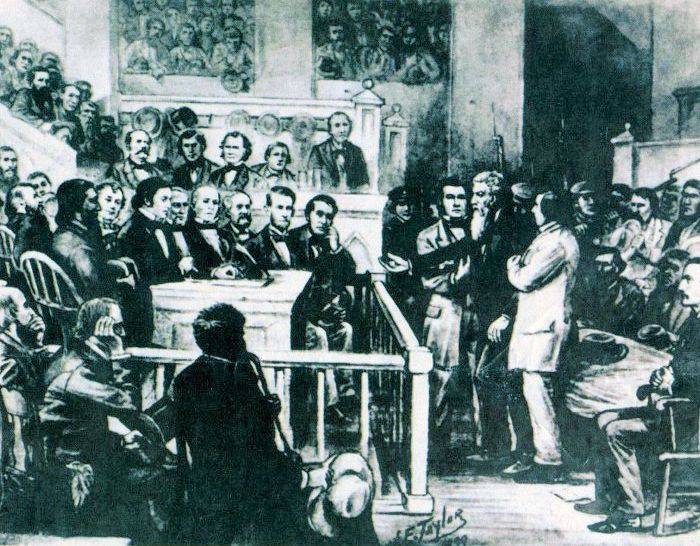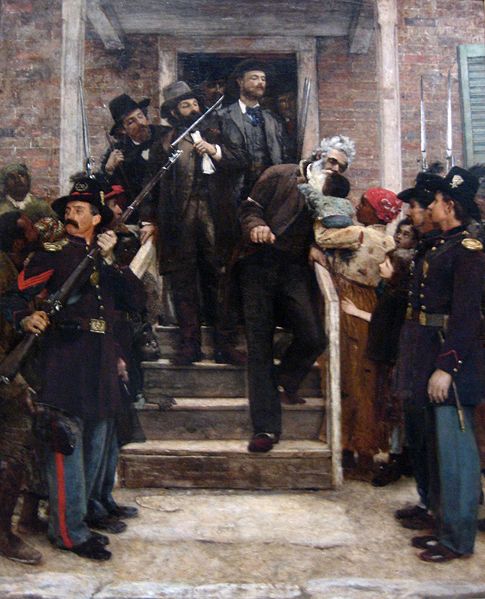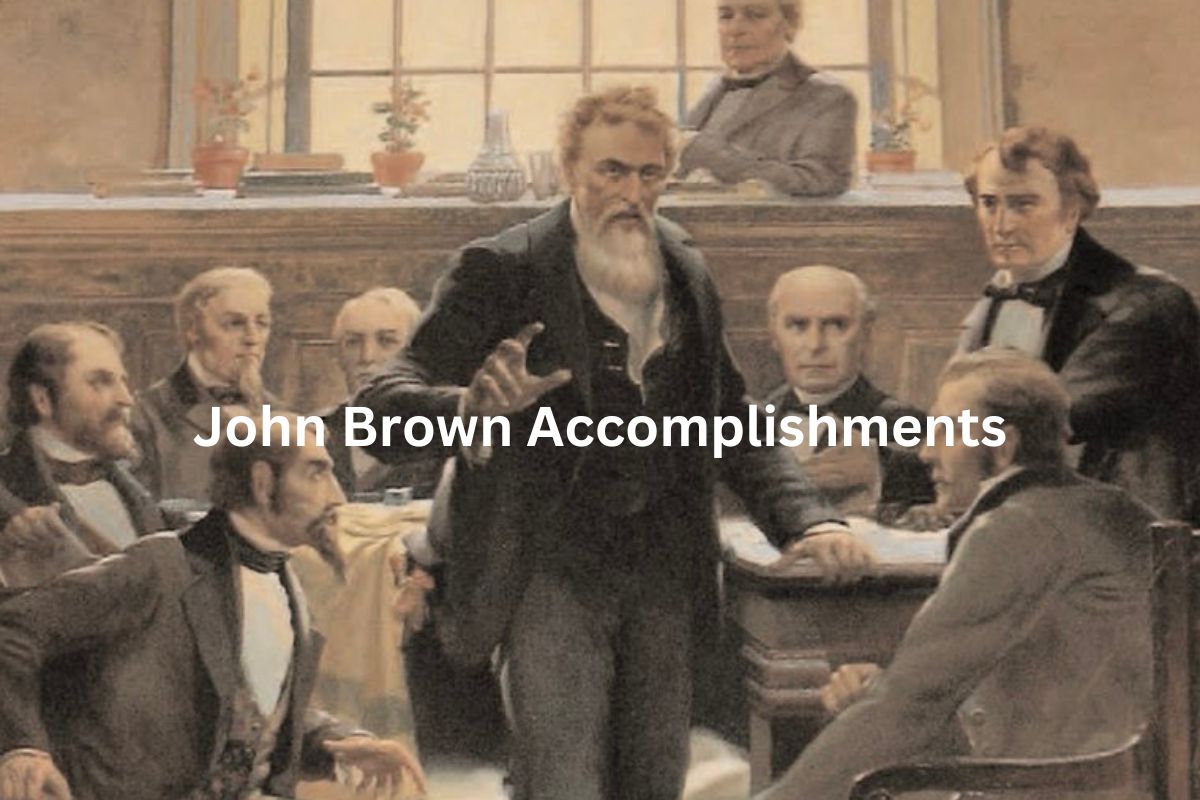John Brown (1800-1859) was an American abolitionist who played a significant role in the fight against slavery in the mid-19th century. Born in Connecticut, Brown dedicated his life to ending slavery and became known for his militant approach.
He participated in the Underground Railroad, helping enslaved individuals escape to freedom. Brown gained notoriety for his involvement in the Pottawatomie Creek massacre in Kansas in 1856, where he and his followers killed pro-slavery settlers. His most famous act was the raid on Harpers Ferry, Virginia, in 1859, aiming to instigate a slave uprising.
The raid failed, and Brown was captured, tried, and executed. Although controversial during his lifetime, Brown became a martyr for the abolitionist cause and is remembered as a symbol of resistance against injustice.
His actions and the debates they sparked played a significant role in intensifying tensions between the North and South, leading up to the American Civil War.
Accomplishments of John Brown
1. Pottawatomie Creek massacre
In May 1856, John Brown and a group of his followers carried out the Pottawatomie Creek massacre in retaliation for the Sacking of Lawrence, a pro-slavery attack on the town of Lawrence, Kansas. Brown and his men, seeking to protect anti-slavery settlers, targeted and killed five pro-slavery settlers along Pottawatomie Creek.
Also Read: Facts About John Brown
This act of violence heightened the tensions in “Bleeding Kansas” and became a notable event in the lead-up to the American Civil War. The Pottawatomie Creek massacre demonstrated Brown’s readiness to use force to combat slavery and established his reputation as a militant abolitionist.

2. Harpers Ferry Raid
On the night of October 16, 1859, John Brown led a raid on the federal armory in Harpers Ferry, Virginia (now West Virginia). Brown and a small group of followers aimed to capture the weapons stored at the armory, distribute them to slaves in the area, and spark a rebellion against slaveholders.
However, the raid did not go as planned, and Brown and his men were surrounded and eventually captured by U.S. Marines led by Colonel Robert E. Lee.
Also Read: Timeline of John Brown
The Harpers Ferry Raid was a pivotal moment in American history, as it intensified the sectional divide and contributed to the growing sense of inevitability for the Civil War.
Brown’s actions at Harpers Ferry made him a household name and a controversial figure, with some regarding him as a domestic terrorist and others as a martyr for the abolitionist cause.
3. Sacrifice for his beliefs
One of John Brown’s notable accomplishments was his unwavering commitment and willingness to sacrifice for his anti-slavery beliefs. Throughout his life, Brown firmly believed that slavery was a moral evil and dedicated himself to the cause of its abolition.
He was willing to risk his own life and freedom to fight against slavery and make a statement against the institution. From his early involvement in the Underground Railroad to his violent actions in Kansas and the ill-fated raid on Harpers Ferry, Brown consistently demonstrated his deep convictions and his readiness to give up everything in pursuit of his beliefs.
This unwavering dedication made him a symbol of radical abolitionism and inspired others to take more assertive measures in the fight against slavery.
4. Inspiration for others
John Brown’s radical actions and unyielding stance against slavery inspired many individuals and abolitionist groups during his time and beyond.
His unwavering commitment to the cause of abolition, as demonstrated through his involvement in the Underground Railroad and his militant activities, served as a catalyst for others to take more assertive measures in the fight against slavery.
Brown’s willingness to confront and challenge the institution of slavery inspired abolitionists to reexamine their own strategies and consider more direct and forceful methods of resistance. His dedication and fearlessness continue to be a source of inspiration for those fighting against injustice and oppression.

5. Martyr for the abolitionist cause
Following his capture at Harpers Ferry, John Brown was tried and sentenced to death. On December 2, 1859, he was executed by hanging. Brown’s execution elevated him to the status of a martyr for the abolitionist cause.
His unwavering commitment to ending slavery, even at the cost of his own life, solidified his position as a symbol of resistance against injustice. Brown’s execution deeply impacted the abolitionist movement, with his death galvanizing support and invigorating the fight against slavery.
His sacrifice further polarized public opinion and played a significant role in shaping the events leading up to the Civil War.
6. Impact on public opinion
The trial, actions, and execution of John Brown sparked intense debates and discussions across the United States. Brown’s acts of violence and his unyielding opposition to slavery forced many Americans to confront the moral questions surrounding the institution.
His actions brought the issue of slavery to the forefront of public consciousness and intensified the already deep-seated divisions between the Northern and Southern states. While some condemned Brown’s methods, others praised his willingness to take a stand against slavery.
Brown’s actions and the subsequent debates surrounding his legacy had a profound impact on public opinion and contributed to the growing polarization between the North and the South. These debates played a significant role in shaping the events that ultimately led to the outbreak of the American Civil War.
7. Influence on Abraham Lincoln
Initially, Abraham Lincoln was critical of John Brown’s methods and considered him a fanatic. However, the Harpers Ferry raid and its aftermath had a profound impact on Lincoln’s perspective.
The events at Harpers Ferry brought the issue of slavery to the forefront of national attention, and Lincoln recognized that the country was moving closer to a violent confrontation over the institution. While Lincoln did not endorse Brown’s tactics, he came to appreciate the intensity of Brown’s commitment and the moral fervor behind his actions.
The raid contributed to Lincoln’s belief that slavery was an irreconcilable issue, leading him to adopt a more resolute stance against the institution and eventually to his election as President in 1860.

8. Catalyst for the Civil War
John Brown’s actions and the reactions they elicited helped to intensify the already simmering tensions between the Northern and Southern states, ultimately contributing to the outbreak of the American Civil War.
Brown’s raid on Harpers Ferry and the violent response it generated in both the North and the South further polarized the country along sectional lines.
Southerners viewed Brown as a dangerous radical who threatened their way of life, while many Northerners sympathized with his cause and viewed him as a martyr.
The Harpers Ferry raid played a significant role in cementing the growing divide between the slaveholding South and the increasingly anti-slavery North, setting the stage for the secession crisis and the subsequent Civil War.
9. Cultural impact
John Brown’s story has had a lasting cultural impact and has been depicted in various forms of artistic expression. His life and actions have been the subject of numerous works of literature, including poems, novels, and plays. Brown’s image has been portrayed in visual arts, with paintings and sculptures capturing his determination and resolve.
Additionally, his story has been adapted into films and documentaries, ensuring that his legacy remains alive in popular culture. The cultural impact of John Brown’s story reflects the enduring fascination and debate surrounding his radical abolitionist beliefs and the tumultuous era in which he lived.
10. Symbol of resistance
John Brown has become an enduring symbol of resistance against injustice and oppression. His unwavering commitment to the abolitionist cause, his willingness to take up arms, and his sacrifice for his beliefs have made him an iconic figure in the fight against slavery.
Brown’s name continues to be invoked as a symbol of defiance and courage, representing the determination of individuals to stand up for what they believe is right, even in the face of overwhelming odds. His legacy as a symbol of resistance resonates beyond the specific context of slavery, inspiring people around the world who strive for justice and equality.
